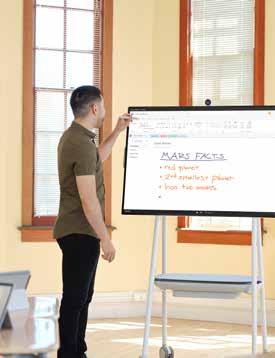

























Henry @henrylstephanie
&
of





























Henry @henrylstephanie
&
of













Tell us about your TikTok journey. How has it impacted your life and career?
I started my TikTok account as a hobby. It has completely changed my life as well as the trajectory of my legal career. It has allowed me to explore a new passion of mine in content creation and take on my dream legal role.







It gave me the stability to leave my position as a tax lawyer and move to my current role at Barbra






Schlifer Commemorative Clinic in Toronto. I provide legal services to women, gender diverse, and non-binary folx in precarious employment situations that have survived sexual harassment or sexual assault. I volunteered with the Clinic throughout law school, and I am thrilled at the opportunity to return as the #AndMeToo project lawyer.









Scotia Boyd @scotiaboydmakeup Film & Television Makeup Artist



While many workplaces were disrupted during the pandemic, its aftermath is increasingly defined by skill shortages. As employers adopt new technology and new business models, today’s workers must be resilient and ready for change.
Given the pace of that change, it is unlikely that one degree or diploma will be enough to sustain a whole career. Lifelong learning is becoming a necessity.
Canada’s polytechnics — the country’s largest institutes of applied and technical learning — are committed to delivering workplace-ready talent.



What advice can you share to help individuals overcome feeling complacent throughout their careers? We all reach a point in our careers when we start going through the motions somewhat aimlessly. I think it’s important to make a practice of assessing where you’re at every six months to a year. Are you getting closer to where you would like to be long term? Are you being challenged creatively? Are you


With nearly 17,000 continuing education and professional development courses available, this very much includes the mid-career workforce.
Industry-relevant training programs are designed to meet today’s needs. Courses in areas like digital marketing, entrepreneurship, business resilience and workplace diversity are relevant, efficient and just-in-time. They are offered in formats including online, hybrid and in traditional classroom settings. Most cost less than $500 and take fewer than 40 hours to complete.
Polytechnics are also excellent collaborators, creating mission-critical training in cooperation with employer partners. Employers identify skill








learning? If not, what kinds of changes can you make now to put you on the right path to achieving your goals? Stopping to assess can help with complacency because you’ll either see where you can make some changes, or you’ll be able to appreciate the job that you have now and the freedoms and trade-offs that it brings you.




The Southern Alberta Institute of Technology (SAIT) understands the pertinence of continuous learning — that’s why they’ve introduced micro-credentials.
Katherine Cappellacci
SAIT’s micro-credentials known as SAITMicro are specific, competency-based courses offering students the chance to develop practical, essential skills for today’s workforce. These short, specialized courses are designed and implemented to meet current industry standards — and give students a credible and sharable digital badge which validates specific competencies to employers. They’re available in a wide variety of disciplines, including construction, energy, digital transformation, software and programming, welding, business, media arts, and transportation.
The demand for micro-credentials is significant, as industries are growing and changing at record speeds. “Learning isn’t linear anymore,” says Chris Wharton, Product Manager for SAIT’s Centre for Continuing Education and Professional Studies (CEPS). “Industry is changing quickly, and people need to stay up-to-date. It’s forcing folks to upskill and embrace lifelong learning.”

Educational institutions are adopting alternative, complementary pathways to support lifelong learning and career success.
SAIT’s micro-credentials are flexible, agile, job advancement tools that are available to anybody, regardless of what career phase they’re in.
Learn at your own pace
“SAIT’s micro-credential framework was created to meet the changing needs and skill gaps of industry,” says Patty Moore, Manager of Curriculum Development at CEPS.
“Micro-credentials are designed to offer participants personalized, flexible learning pathways.”
Micro-credentials are an excellent way for industry professionals to upskill, reskill, advance, or shift professions, and also for career-starting students wanting to test out potential job pathways. SAIT wanted to reduce all possible barriers that could limit a student’s potential, which is why their courses are tailored to suit individual schedules. Micro-credentials can be taken online, in person, asynchronously, at night, on the weekend, or in a combined formation.
Industry is changing quickly, and people need to stay up-to-date. It’s forcing folks to upskill and embrace lifelong learning.
Plus, they can be stacked and applied towards a certificate of achievement. While earning higher credentials, successful students receive a digital badge that can be electronically displayed. “Presenting a digital badge is a great way for professionals to show that they’ve been verified as knowledgeable and capable in an in-demand skillset,” Chris adds.
Leading the way
Throughout its 106-year history, SAIT has established itself as a leading training facility capable of adapting to all industry developments and shifts. They’re working together with industries to not only uphold their current standards, but also to develop bright, prosperous futures. Their forward-thinking ethos is what led SAIT to establish the Centre in April 2020, the home base for micro-credentials.

“We’re driven by providing premium-level applied learning and hands-on experience,” says Vis Naidoo, Director of CEPS. “We’re able to do so because of our exceptional instructors — they’re industry professionals with extensive experience and ample knowledge.”
SAIT provides a range of support to help students throughout their academic journeys, including financial aid. They’re proud of their school’s positive, inclusive environment. “At SAIT, it’s not just what you learn — it’s the entire experience that helps our students grow into driven, hard-working professionals,” Vis adds.
The future of education
With world-class training facilities and well-established industry partnerships, SAIT supports every step of a student’s lifelong learning process, especially through their micro-credential courses. “SAIT is a great institution for a broad range of skill development in technology, business, trades, and more,” Chris details. “We go a step further to build a curriculum that’s dynamic and ambitious.”



Upskilling and reskilling helps today’s workers stay relevant and competitive. Here’s how Continuing Education at University of Calgary helps bolster career success for learners of all ages.
Few people in the modern era complete a degree or diploma, work a career that spans the length of their adult lives, and retire to a comfortable pension at 65. For better or worse, those days have largely come and gone. But education leaders like the University of Calgary are keeping up with the demands of the new face of work. That's where Continuing Education fits in.
We are now in the era of the “lifelong learning model,” where individuals who wish to stay competitive in their field must continuously upskill. Likewise, as many sectors undergo rapid shifts due to automation, the pandemic, and other world events, reskilling to enter a brand new field is becoming increasingly common.
Fortunately, the tradeoff for a relative lack of stability is a wealth of opportunity and a new kind of vocational freedom unique to the modern age. The reality of a shifting workplace model can be daunting, but with the right tools learners of any age can take advantage of the opportunities it affords.
What’s the difference between upskilling and reskilling?
Upskilling refers to the continuous acquisition of new knowledge in your current field of practice, which helps you stay current and competitive, gain new insights informed by the latest industry-rooted knowledge, and even increase your chance of getting a promotion or salary bump. Reskilling is the process of learning a new skill set with the goal of changing careers. A new path may be closely related to one’s previous vocation, a fresh start in a new sector, or something in between. Institutions are adapting to meet the needs of adult learners, and in today’s world, there is no age limit for upskilling and reskilling.
Continuing education is invaluable for anyone looking to make a career change, but especially for individuals in unpredictable sectors, who would do well to be ready when opportunity knocks. If you are unemployed, underemployed in your current job, or plan to switch to a new field, the need to consciously design your future with the help of today’s flexible educational opportunities is more pressing than ever before.

Embarking on an educational journey as an adult is a concrete way to invite a new challenge into your life, increase your self-confidence, gain leadership qualities and skills, support your mental well-being, and feel the satisfaction of achievement. As many UCalgary certificate graduates would tell you, the extensive personal benefits of education are worth pursuing in their own right.
Industry-rooted education gives lifelong learners an edge
Continuing Education at the University of Calgary is fundamentally rooted in the demands of the workplace, emerging trends, and new technologies thanks to the industry-connectedness of its instructors. They are real-world experts in their fields, and bring valuable practical experience to the classroom.
“UCalgary does a great job choosing instructors,” says Karen Cunliffe, a graduate of several Continuing Education programs, including her recent completion of the Occupational Health and Safety Diploma. “They're not just academically strong ... they have strong business acumen and can share reallife stories that help students translate their learning into workplace scenarios.”
For continuing education, flexibility is key
UCalgary Continuing Education’s mandate is to offer a wide range of programs to individuals and organizations seeking opportunities for professional development and personal enrichment. To fulfil this mandate, it offers short-term, part-time, full-time, online, and in-class programming options designed to fit a wide range of lifestyle and scheduling needs. Whether you work full-time, are raising a family, or simply prefer distance learning for convenience’s sake, there’s an option for you.
Best of all, there’s no cumbersome application process, and no need to register for a certificate or program before enrolling. Just choose your course and enrol online.
A broad catalogue of courses for today’s workplace needs
A key driver in Continuing Education’s offerings is a breadth of courses for a wide variety of learners, each plugged into a specific industry need and designed for workplace advancement.
For example, students looking to enhance their leadership skills can enrol in courses like Change Management, Emerging Leaders, Front Line Leaders, and Professional Management. High-level professional communication is crucial for workers in virtually every sector, and programs like our Business Seminars and Professional Writing certificates will help you hone this crucial skill set.
As marketing evolves at a rapid pace with the development of new technologies, creative professionals are in increasing demand. In addition, the growing field of data science is tapping into new sectors every day.
With more than 50 Certificate, Diploma and Designation Programs UCalgary Continuing Education has something for you.
Seize opportunities, step out of your comfort zone and start something! How do you want to design your future?
I want to manage or lead
Explore: Change Management, Emerging Leaders, Front Line Leaders, Professional Management
I want to communicate professionally
Explore: Business Seminars, Creative Writing, Professional Writing in Business and Technical Writing, Professional Writing in Marketing and Public Relations
I want to teach adults
Explore: Adult and Community Education, Adult Learning, e-Learning, Teaching Second Languages, Workplace Learning
I want to pursue the creative marketing field
Explore: Digital Marketing, Front-End Web Development, Graphic Design, Integrated Digital Media, Marketing Fundamentals
I want to work with data
Explore: Business Analysis, Business Intelligence and Analytics, IT Fundamentals
I want to make smart business decisions
Explore: HR Fundamentals, Professional Management, Project Management, Small Business Management Basics for Entrepreneurs, Tech Management
Corporate training is another component of Continuing Education at the University of Calgary. For organizations looking to re-energize their workplace and deliver professional development opportunities, Corporate Training provides tailored training for both leaders and employees. Our collaborative approach with industry professionals contributes to our client's success and their employee's satisfaction at work.
The University of Calgary believes in lifelong learning and knows that continuous learning is the primary way to succeed in today's ever-changing workplace. Continuing Education constantly adapts to support a variety of learners, including midlife career changers, entry-level learners, new Canadians, part-time learners, and unemployed individuals.
UCalgary’s community stretches far beyond the province, with students hailing from across Canada and internationally. Immersing yourself in a globally recognized institution can help establish or expand your network of friends and colleagues, and aid newcomers in their transition into the Canadian workplace, complementing credentials from other countries.
We hope to see you in the classroom or online soon!


More than ever before, people are pursuing post-secondary education online because of the many flexible, accessible options it presents.

In recent decades, the ways in which students attain post-secondary education has undergone a massive shift. Influenced by modern socioeconomic and cultural changes, a person’s relationship with education is no longer linear. Plus, the internet has fused our technologically driven society together, which is why many colleges offer courses online.
Through online learning, students can successfully complete their education and only physically enter a lecture hall rarely, if at all. Students have the chance to take classes asynchronously, making online learning incredibly flexible.
Online courses also allow students to not only learn from anywhere, but they can often adjust their schedules to suit their daily lives or work schedules. This is especially important, as lifelong learning and upskilling have
become imperative to an employee’s ability to stay current or move up the career ladder.
Courses anytime, anywhere
Online learning allows professionals to attain advancing skills without disrupting their working lives. Changing careers is also a modern workforce trend, one that online learning makes possible for people in the workforce without having to quit their current jobs and return to a college campus.
The flexibility of online learning can also make education more accessible for remote communities, and to people who would otherwise not be able to attend classes for a variety of economic, social, or physical barriers. It allows parents to pursue education while raising families, caters to self-motivated learners, and encourages people to return to education whenever they can, wherever they are.
There are a lot of buzzwords and hype out there around the future of work. You may be wondering: what does the future of work look like? How can I thrive?
At the University of Toronto School of Continuing Studies (SCS), we’re eager to distill the important facts about 21st-century skills. Here’s what you need to know:
LIFELONG LEARNING
Algonquin College is proud to offer a fully online campus that caters to any student’s academic journey. Over the last 16 years, they’ve built a reputation as leaders in personalized learning by strategically implementing infrastructure that allows them to help each student achieve success.
Online by design
Unlike many colleges and universities that made the emergency switch to virtual learning during the past two years, Algonquin College had been planning and running their online campus long before. “We have over 800 courses that were intentionally built for full online delivery,” says Leszek Nowosielski, Dean of Algonquin College Online.
To ensure maximum flexibility, Algonquin’s online programs can be taken full-time or part-time in an asynchronous environment.
With the ability to start a course at the beginning of any month, students can maintain a healthy work-life balance while building their careers.
Learning and having a career isn’t a linear path like it might have been in the past; it’s an intricate journey full of twists, turns, and exciting opportunities. It doesn’t end once you’ve earned a college or university credential! Continuing education is critical for workforce engagement and personal satisfaction.
SKILLS GAP
This term means there is a disconnect between the qualifications employers are looking for, and the skill sets that potential employees have. This gap has widened. Why? The pandemic, shifting changes in digital technology, and dynamic global markets have accelerated changes that were already occurring pre-COVID-19.
INDUSTRY 4.0
Don’t be freaked out by this scary-sounding term! Industry 4.0, also called the Fourth Industrial Revolution, simply refers to the increasing emphasis on digital and tech-
nology-focused skill requirements. We’ve moved beyond the emergence of the personal computer, and we are in a new era of automation and artificial intelligence.
UPSKILLING AND RESKILLING
These have a common goal, but they are easy to mix up! Upskilling means you are enhancing your current knowledge and skills, whereas reskilling means you are building on your existing knowledge while gaining in-demand skills in a new domain. Both help you gain 21st-century job qualifications.
What does this all mean?
Industry 4.0 = Increasing skills gap. The answer to the skills gap? Lifelong learning! At SCS, we offer dynamic continuing education opportunities that can help you grow and thrive in the face of unprecedented change.


I had a fear of online learning because of my negative past experiences with it at university, but Algonquin exceeded my expectations.
Nadisha Mendes, who completed the Human Resources Management program online, found the support she needed at Algonquin. “I had a fear of online learning because of my negative past experiences with it at university, but Algonquin exceeded my expectations.”
For any of her friends trying to upskill while working full-time, Nadisha recommends Algonquin. “My facilitators were so accommodating and accessible. Plus, their online platforms are super easy to use.”
Ensuring success Algonquin is there for you every step of the way. “There’s a whole student success network that is there to offer support, beyond what’s typically expected,” says Leszek. “You’re not alone in your education journey — there are people here to ensure you succeed.”




Upskilling or reskilling through continuous education is necessary to adapt to an ever-changing workforce and for personal career satisfaction.
Whether you are a new Canadian, a displaced or unemployed individual, in an entry-level position or ready for a mid-life career change, the need to be prepared for the future of work is more pressing than ever before. The member institutions of the Canadian Association of University Continuing Education (CAUCE) recognize emerging trends and are well-positioned to offer flexible and short-term programs designed to help adult learners fill skill gaps and compete in today’s workplace.
According to Dr. Sheila LeBlanc, President of CAUCE and Director of Continuing Education at the University of Calgary, “Upskilling and reskilling are not new concepts and are now considered necessary for individuals to stay relevant and adapt quickly to an ever-changing workforce and for personal career satisfaction.”
Upskilling helped recent graduate Kristel Véliz, launch a new career. Although she had a master’s degree in political science and government experience, when Véliz decided to reorient her career to specialize in public relations, she needed to upskill. Véliz says, “The diploma program in public relations and communications management at McGill School of Continuing Studies gave me the skills and confidence I needed to relaunch my career and, when I graduated, I was hired at the Government of Canada. The value of upskilling? Priceless.”
A micro-credential from Simon Fraser University (SFU) helped Cirque du Soleil acrobat Laura-Ann Chong reskill and leap into an alternative career when the pandemic shut down live performances around the world. Chong completed the
for the



As industry changes, new modalities of learning like direct credentials are a fast, and cost-effective way to ensure workers’ skills remain relevant.
Anne Papmhel

Alberta has seen some massive economic disruption over the past few years. Beyond the pandemic and the normal ups and downs of the oil and gas industry, the province is responding to rapid growth in areas such as energy transition and information technology. “While this brings great opportunities to Alberta, there are also implications for future skills requirements,” says Laura Jo Gunter, President and CEO of the Northern Alberta Institute of Technology (NAIT).
To prepare their workforce of the future, employers might consider turning to polytechnics for help with upskilling and reskilling their teams. “Not only do we have the ability to develop foundational skills through our apprenticeship, diploma, degree and certificate programs, but we also have very robust professional and skills development offered through our corporate and continuing education offerings to help people upskill and reskill quickly for these new jobs or functions,” says Gunter. “Also, our close ties to industry keep us very plugged in and connected to their talent needs,” she says.
What are direct credentials and how do they speed up the reskilling process?
Through an innovative concept in development called “direct credentials”, NAIT hopes to further help Alberta meet its current and future skills requirements. Whereas the traditional path involves taking a course or

program and undergoing a skills or competency assessment at the end, the direct credential path conducts the assessment first.
“This approach lets us identify the specific skills gaps of current and potential employees up front,” says Brock Olive, Executive Director of Corporate and Continuing Education at NAIT. “If the gaps are small, the learner can fill them through one of our micro-credentials — a shorter form of training to certify that they have the specific skill or competency the employer needs,” says Olive.
An obvious benefit of direct credentials is in expediting the training. “Rather than taking courses on things they already know, they can just complete an assessment, and if successful, can get certified faster,” says Olive. This makes it easier and more costeffective for employers and organizations to meet the ever-changing market demands. “This is important because the opportunity costs of having to come back to school when you’re older are quite high, so direct credentials add to the ecosystem of options for upskilling and reskilling,” says Olive.
Making career transitions easier for Canadians
NAIT’s targeted professional development offerings, including micro-credentials, can be particularly valuable for employees moving from one career to another where there is a lot of affinity or overlap between the two. “Project management is one example. It’s a fairly generic skillset, but there will be gaps if one is transferring from one industry to another, so letting employees fill these in through micro-credentials saves a lot of time, especially when employers need to upskill and reskill a lot of people,” says Olive.
Direct credentialing is also a way to help different underrepresented groups in the labour market, such as newcomers to Canada. “They may have a lot of direct work experience, but their education isn’t recognized in this country,” says Olive. “Direct credentials are a path for them to get that recognition and participate fully in our labour market, which will help solve some of the labour gap challenges,” says Olive.
Currently, NAIT has 16 micro-credential offerings and has provided 2,700 micro-credentials to learners in the last 18 months. Learners receive a digital badge for each micro-credential competency or learning outcome achieved, which they can display to their peers, professional network, or current or potential employers.
What is NAIT’s vision for the future?
As a world-leading polytechnic, our vision is based on our impact. We call this the NAIT Effect. We want to have an impact on students in making sure they get that meaningful career. We want to have an impact on industry by making sure they get the talent and applied research they need to thrive and be globally competitive. More broadly, we want to have an impact on creating a prosperous future for Albertans.

What are the benefits of that vision? Industry knows that the talent they need can walk out our door and into theirs, ready to work. There are also benefits to the community. Having people in good careers in industry sectors that are thriving leads to vibrant communities.
What are the opportunities for workers and employers?
This is an exciting time as Alberta reinvents itself. Of course, Alberta is known for energy, and now with energy transition, there are opportunities in emerging areas like electric vehicles and carbon capture, utilization and storage. But energy isn’t the only industry here. We also have a top AI centre in Edmonton, as an example, so there are a lot of opportunities in tech innovation and industries.
How are you bringing the new vision to life through continuing education and micro-credentials?
The promise of micro-credentials is getting people skilled up and job ready quickly. Post-secondary institutions have always helped to fill skills gaps with degrees, diplomas, and certificates. By offering the direct credential path through our Corporate and Continuing Education, alongside the traditional course path, we’re helping students avoid having to take courses on things they already know. We expect to be using this direct path model for many roles with corporate partners in the future.

What are some of the emerging roles that could benefit from direct credentials?
We expect to see benefits in technical roles such as software development, cyber security, block chain, and renewable engineering. There may also be opportunities within the banking, insurance, and healthcare sectors that require front-line workers to have essential communication, problem solving, or adaptability skills. For many of these roles, the competencies are still being mapped out, but we will evolve our micro-credentials to respond to our learners’ and employers’ professional development needs. Learn more at nait.ca/directcreds

Microsoft is reimagining the classroom of the future and empowering educators and students with its innovative software and strategies for high-impact learning.
Amardeil
Tania
The way that we work and learn is evolving at breakneck speed.
As workplaces and classrooms continue to be challenged and to transform into hybrid models, technology is playing a vital role in creating connected, collaborative, and engaging platforms for the worlds of work and education. And collaboration across industries and institutions is essential in bringing these technologies to bear.
“We work with school boards across the country as well as higher education institutions to help them imagine the possibilities for the future of teaching and learning,” says Dr. Elka Walsh, National Learning and Skills Lead at Microsoft Canada. “We want to empower learners with the skills that they need to thrive both as citizens and in the world of work.”
Defining the future of learning
The shift to hybrid work with distributed teams has put a newfound focus on the need to collaborate and communicate effectively. The same thing is happening in classrooms, with the move to hybrid learning.

“We did some research during the pandemic and found that as learning experiences shifted into online learning, there was a 60 percent drop in student engagement,” says
Dr. Walsh. “Student engagement is so important — it’s a proxy for student success. So we need to think about how we’re engaging students.”
The solution, says Dr. Walsh, is to focus on high-impact learning strategies. “It’s more than just video conferencing,” she says. “It’s about communicating, collaborating, and creating content together.”
Through
and

Microsoft’s innovative software offerings help to foster collaboration and communication. “Higher education institutions are using technology like the Microsoft Surface Hub — an interactive whiteboard — for example, so both students who are in the room and students joining remotely can collaborate together in real time, creating a really dynamic experience,” says Dr. Walsh. Microsoft Teams allows students and educators to meet, collaborate, create, and share resources all in one place, while the Microsoft 365 Education suite gives students the tools they need to unlock creativity and promote teamwork.
Removing barriers to education Microsoft’s software options are also driving inclusion and access to education. “What Teams also enables us to do is
create more inclusive and access ible learning so that every student can participate,” says Dr. Walsh. “When we include OneNote, our classroom notetaking program within Teams, this removes even more barriers so that every single learner can thrive,” says Dr. Walsh. “It includes things like Immer sive Reader, Dictate (a speech-to-text feature), and translation technol ogy. These are the kinds of technologies that really remove barriers for students who face any kind of learning disability or hearing barrier as well as international students and newcomers to Canada.”

Now is the time to pivot our learning models and to engage every single student, while also removing stigmas and barriers.
“We’re at an inflection moment, especially for higher education,” says Dr. Walsh.
“Through deep collaboration with industry and post-secondary institutions, we have an opportunity together to transform learning experiences and to imagine the future of what’s possible for our students, and to set them up to thrive in our changing world. We can empower every single student across Canada, and this is our moment to be working together.”
